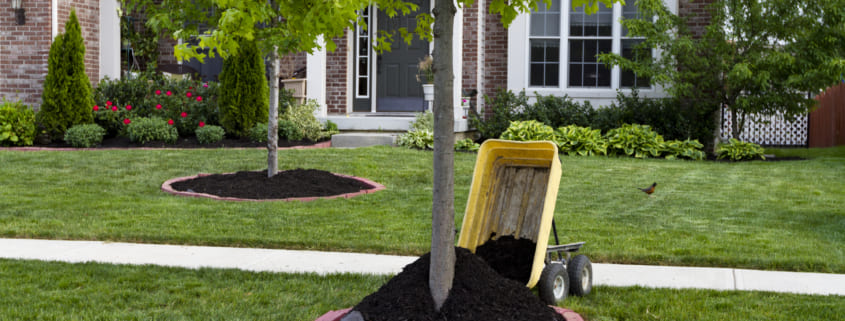Mulch can protect your plants, reduce your water consumption, and add that finishing touch to your garden beds. However, many of them are made from organic materials, and they can decompose over time. Whether you use natural or inorganic materials, you will need to perform maintenance to keep it looking great throughout the years.
Average Lifespan
Depending on the type of material and your watering schedule, your mulch’s lifespan can vary. Wood chips and bark are the most common types of mulch. They are more prone to decomposing than thicker materials. Wood chips can last about five to seven years. On the other hand, bark can last for seven to ten years. Since bark consists of the hardest part of the tree, it is more durable than the scrap lumber material used for wood chips.
In most cases, all organic mulch has a lifespan between five to six years. However, there are some cases where you will need to replace them every one to two years. With any type of organic, it can decompose and will need to be replaced.
There are two ways to determine the lifespan. The practical life of mulch can be between four to seven years. This time is how long it takes for a layer to break down. When it completely degrades, it will no longer provide ground cover or create heat to protect your plants.
The aesthetic lifetime is significantly shorter. It does last between one to two years. When it is exposed to the elements, it will begin the decomposition process and start to change its appearance. After one to two years, it will start to lose color. You may notice bare spots in your yard. At this time, you should replace the old mulch.
If you are thinking about adding mulch to your yard, you will need about two to three inches of the material. In areas with severe rainstorms or wind, you should add more to ensure the proper coverage for your outdoor space. Frequent rains can cause the mulch to decompose quicker than in a drier environment.
Consider Undyed
If you are concerned about the aesthetics of your mulch, you might want to choose an undyed variety. Dyed mulches can start to turn gray after a year of application. It is still helping to keep weeds at bay, but it might not look attractive in your yard. For many people, they will replace the faded mulch to improve the look of the garden beds.
For those who don’t want to replace mulch every year, you should not choose dyed materials. If you do use dyed mulch, you also want to know how the mulch was colored to avoid any negative impacts on your outdoor space. In some cases, cheap dyes can penetrate your soil and create an unhealthy environment for your plants.
Size Is Important
Your mulch size also impacts the lifespan of the material. Wood chips do not last as long as bark mulch. Shredded mulch can blow away in the wind or wash away with heavy rains. You will also need to replace shredded material more often than chips or nuggets.
Replace
You should always keep track of the initial installation date of your mulch. In addition to that, look out for the early signs of decomposition, including soggy mulch. Wet can be a sign of improper drainage as it starts to rot in your garden beds. You also want to watch out for any mulch that may have blown away in the wind. If you notice these spots in your yard, then you should fill in those bare areas. For the best results, you should have a one to three-inch layer of mulch.
The Issues With Old
After a few years, the mulch will decompose and not provide any benefits for your yard. When you use organic mulch, it contains nutrients and retains moisture for your soil. When the depth of the mulch decomposes, you will start to see more problems with weeds and soil erosion.
For many people, mulch is used strictly for aesthetic reasons. Throughout the seasons, the mulch will lose its color and fade. While it can take several months or years, mulch will inevitably need to be replaced.
Inorganic Could Be a Solution
If you are looking for mulch that does not need much maintenance, you should consider inorganic materials. Glass, rubber, and stone can give you the same aesthetic appeal as organic mulches. Your flower beds and gardens will also be protected from weeds and soil erosion. However, your soil will not reap any nutritional benefits from these inorganic mulches. Some inorganic mulches can also cost more than natural products. All those reasons should be taken into consideration before adding mulch to your yard.Maintenance
If you want to find a low maintenance mulch, then you should choose a large bark mulch for your yard. Some of the best choices are cedar and cypress bark, but these materials will decompose slower than other options.
With the right natural mulch, you will need minimal maintenance. You should always keep the layer depth in the one to three-inch range. In addition to that, the trees and plants will need some space around them to provide adequate air circulation and keep away insects.
Many factors can determine when you need to replace the mulch. When you start to see signs of decomposition, your mulch should be replaced or replenished as soon as possible. In about five to six years, you should consider a full mulch replacement of your yard. If you need help to find the best mulch for your yard, Charlestown Landscaping is ready to assist you. We can help you choose the right variety and help to install mulch throughout your yard.
If you need to know more about our mulching services, please take a few minutes to fill out the contact form.

